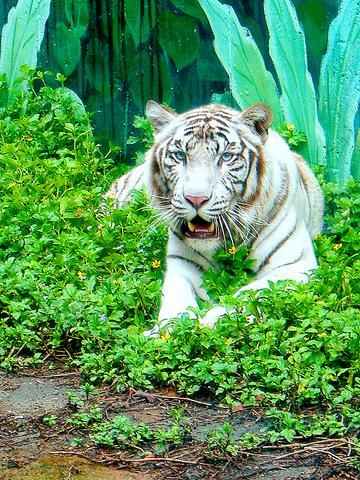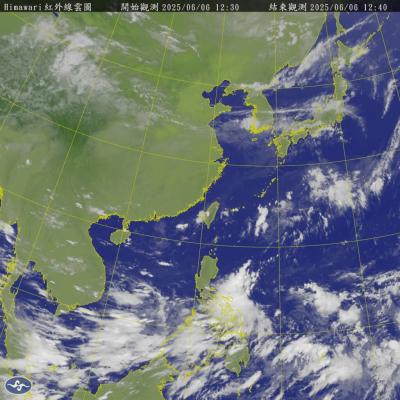Animal-rights activists yesterday slammed the private Leofoo Village Theme Park in Hsinchu for displaying a white tiger and attempting to breed it, saying that breeding white tigers is an act of brutality against animals and is motivated solely by a desire to make money.
According to the Environment & Animal Society of Taiwan, there are less than 300 white tigers in the world. Despite the animals' rarity, the society says that they do not qualify as an endangered species because they are not in fact a species -- instead, they are ordinary Bengal tigers with a color mutation.
Early this month the theme park acquired two tigers -- a white tiger from Indonesia, and a female tiger which looks like an ordinary Bengal tiger, but which was bred from white parents.

PHOTO COURTESY OF ENVIRONMENT AND ANIMAL SOCIETY OF TAIWAN
The society says that all existing white tigers are descendants of one male specimen named Mohan, captured in 1951. Since then, efforts to breed white tigers from a limited gene pool have resulted in birth defects such as club feet, cleft palettes and crossed eyes, according to the society.
for greed's sake
The society maintains that breeding white tigers has nothing to do with conservation but instead is a practice carried out for greed's sake by zoos, breeders and circuses.
The theme park's administration told the Taipei Times yesterday that its mission is to preserve rare animals and that the white tiger at the park is not some kind of natural aberration.
"White tigers are actually as healthy as normal Bengal tigers. The white tiger that we have is in very good health," said Cherry Huang (黃倩縈), head of the theme park's marketing department.
Huang said that the white tiger was brought into the country in accordance with the law.
"We just want to introduce rare things to people in Taiwan," Huang said.
At a press confersence, the society released a video showing the rare tiger's activities at the theme park.
"These unsightly and unhealthy white tigers have ended up as specimens," society president Wu Hung (
"We are opposed to producing more white tigers. The theme park is actually creating new specimens of these tigers," Wu said.
genetic flaws
Society director Chen Yu-min (陳玉敏) said that genetic flaws such as those that account for white tigers' coloring are usually not passed along in the wild because white animals in a jungle environment are at a heavy disadvantage with their inability to hide and to stalk prey.
The society also released a letter yesterday from Zoocheck, a animal-protection organization in Canada.
Zoocheck director Rob Laidlaw condemned the theme park's introduction of the white tiger.
Laidlaw argued that staging popular animal exhibits in this fashion served no genuine conservation purpose.
"The material and financial re-sources dedicated to these animals would be better spent on helping tigers in the wild and in legitimate captive propagation programs," Laidlaw wrote.
Society activists said that they, along with other groups, would soon launch a boycott of the theme park.
Since early this month, society activists have visited the zoo three times to observe the conditions under which the white tiger is exhibited.
"We don't see any serious animal conservation education. All we see is white tiger T-shirts and mugs," Chen said.

STAY AWAY: An official said people should avoid disturbing snakes, as most do not actively attack humans, but would react defensively if threatened Taitung County authorities yesterday urged the public to stay vigilant and avoid disturbing snakes in the wild, following five reported snakebite cases in the county so far this year. Taitung County Fire Department secretary Lin Chien-cheng (林建誠) said two of the cases were in Donghe Township (東河) and involved the Taiwan habus, one person was bit by a Chinese pit viper near the South Link Railway and the remaining two were caused by unidentified snakes. He advised residents near fields to be cautious of snakes hiding in shady indoor areas, especially when entering or leaving their homes at night. In case of a

A tropical disturbance off the southeastern coast of the Philippines might become the first typhoon of the western Pacific typhoon season, the Central Weather Administration (CWA) said. The system lacks a visible center and how it would develop is only likely to become clear on Sunday or Monday, the CWA said, adding that it was not yet possible to forecast the potential typhoon's effect on Taiwan. The American Meteorological Society defines a tropical disturbance as a system made up of showers and thunderstorms that lasts for at least 24 hours and does not have closed wind circulation.

ENERGY RESILIENCE: Although Alaska is open for investments, Taiwan is sourcing its gas from the Middle East, and the sea routes carry risks, Ho Cheng-hui said US government officials’ high-profile reception of a Taiwanese representative at the Alaska Sustainable Energy Conference indicated the emergence of an Indo-Pacific energy resilience alliance, an academic said. Presidential Office Secretary-General Pan Men-an (潘孟安) attended the conference in Alaska on Thursday last week at the invitation of the US government. Pan visited oil and gas facilities with senior US officials, including US Secretary of the Interior Doug Burgum, US Secretary of Energy Chris Wright, Alaska Governor Mike Dunleavy and US Senator Daniel Sullivan. Pan attending the conference on behalf of President William Lai (賴清德) shows a significant elevation in diplomatic representation,

Credit departments of farmers’ and fishers’ associations blocked a total of more than NT$180 million (US$6.01 million) from being lost to scams last year, National Police Agency (NPA) data showed. The Agricultural Finance Agency (AFA) said last week that staff of farmers’ and fishers’ associations’ credit departments are required to implement fraud prevention measures when they serve clients at the counter. They would ask clients about personal financial management activities whenever they suspect there might be a fraud situation, and would immediately report the incident to local authorities, which would send police officers to the site to help, it said. NPA data showed